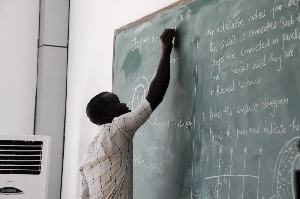The Campaign Against Privatisation and Commercialisation of Education (CAPCOE) has called on government to increase its investment in education to help promote quality education in the public sector.
It said more and improved educational infrastructures were needed particularly at the basic level, adding that government should make the environment attractive for learners.
This was during a day’s training for journalists on Public-Private Partnership (PPP) in education held in Accra on Wednesday.
It was organised by CAPCOE in conjunction with the teacher unions, among others.
The Deputy General Secretary in charge of Education and Professional Development of the Ghana National Association of Teachers (GNAT), Gifty Apanbil said there was the need to create a platform to discuss how to provide quality education in the public schools.
It should include; all stakeholders namely: parents, teachers, children and government to help identify the reasons children from the public schools were not performing as compared to their counterparts in the private sector.
Deputy Secretary-General in charge of Administration and Labour Relations of GNAT, Daniel Affadu said the Sustainable Development Goal (SDG Four) which is to ensure inclusive and quality education for girls and boys by having access to early childhood development, care and pre-primary education so that they were ready for primary education was key.
He said by 2030, they must have completely free, equitable, quality primary and secondary education, leading to relevant and effective learning outcomes.
There should be the elimination of gender disparities in education and ensure equal access to all levels of education and vocational training for the vulnerable, including; persons with disability, indigenous people and children in vulnerable situations.
Mr Affadu said privatising education was not the best in attaining quality education, especially in deprived rural communities with smaller populations and scattered communities, where there were scarcely public schools and children had no option than to attend low-cost private schools, which were unregulated.
He said privatisation Lacked quality and had expensive fees thus, parents who could not afford the fees would not enroll their children till they were four.
Quoting the United Nations-2016, there were rarely public schools in slums due to land issues, saying that about five million Ghanaians lived in 500 slums in Ghana, out of which 70 percent are women.
“Slum dwellers are the poorest in urban areas, the absence of public schools leave them with the option of unaffordable private basic education, which has exclusion tendency on the basis of cost, especially for girls, naming some slums as Asawasi, Kojokrom, Agbobgloshie, Ashaiman, Kasoa.
Programmes Officer of GNAT, Palham Oyiye said most PPPs did not promote quality because they were concentrated in urban areas and did not tend to reach children living in rural areas or the poorest or most difficult-to-reach communities.
PPP is unrealistic in nature as they can always be piloted, but never replicated due to the high cost of managing schools, he said.
Mr Kofi Asare, Development Consultant said the local authorities were overwhelmed with town planning and cannot build public schools for slum dwellers who were mostly poor.
General News of Thursday, 19 December 2019
Source: ghananewsagency.org













